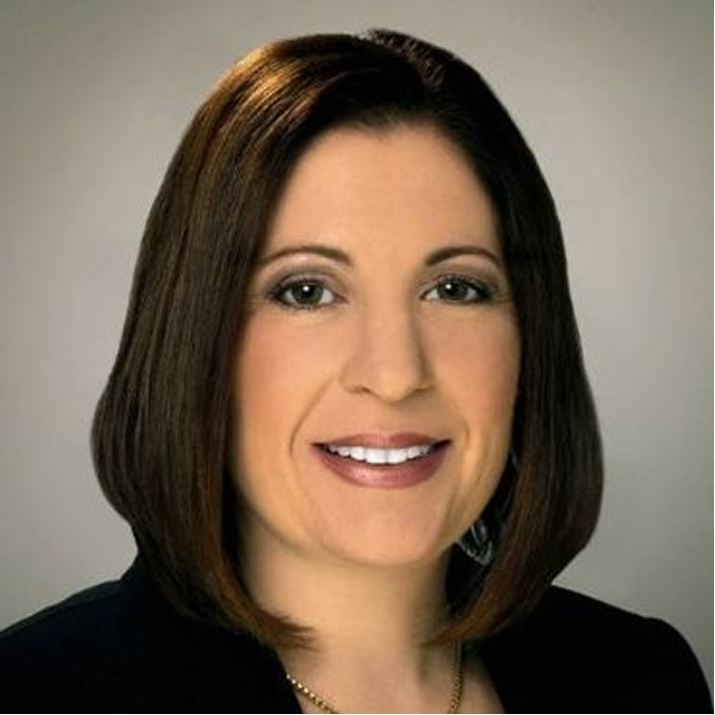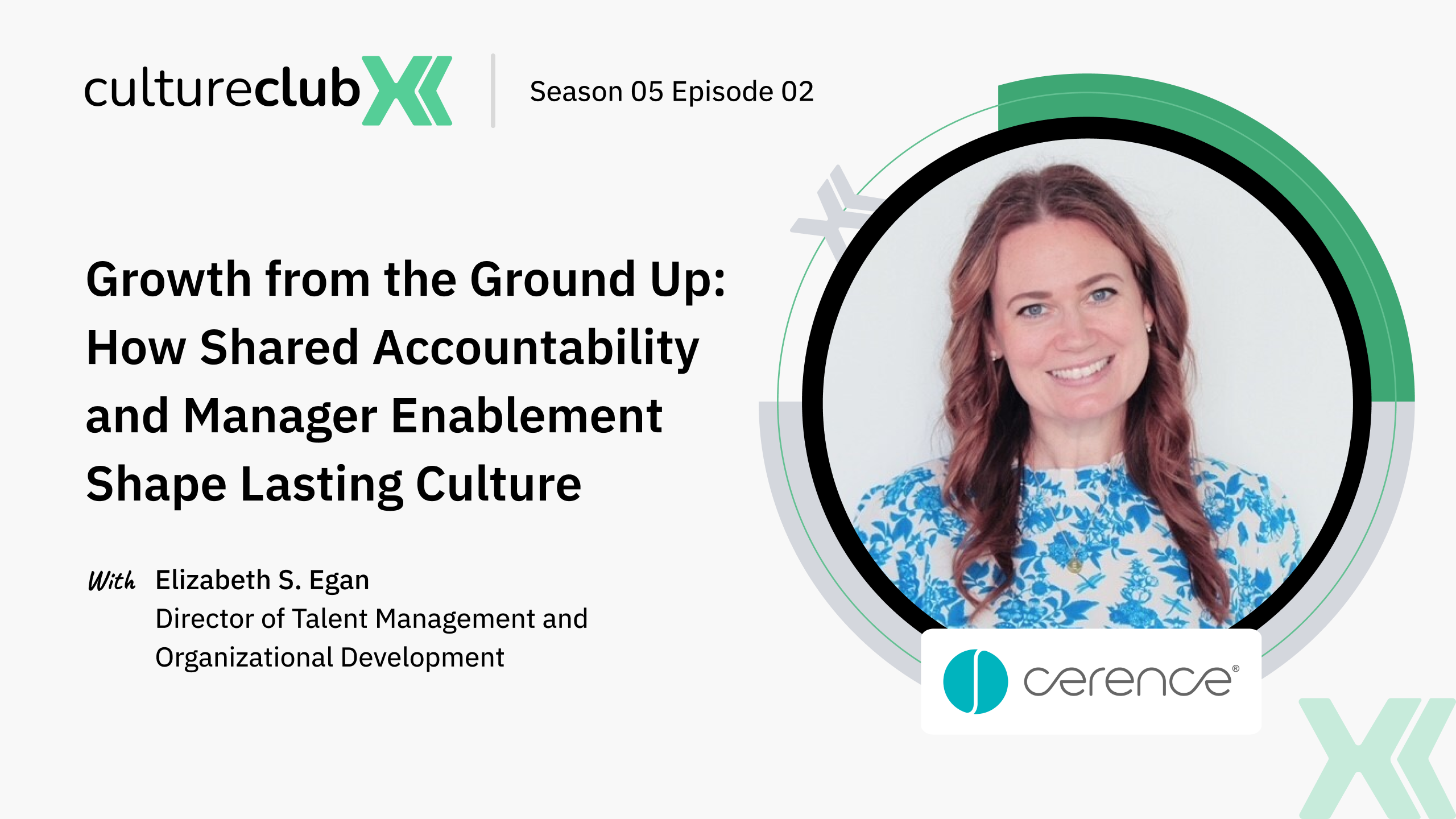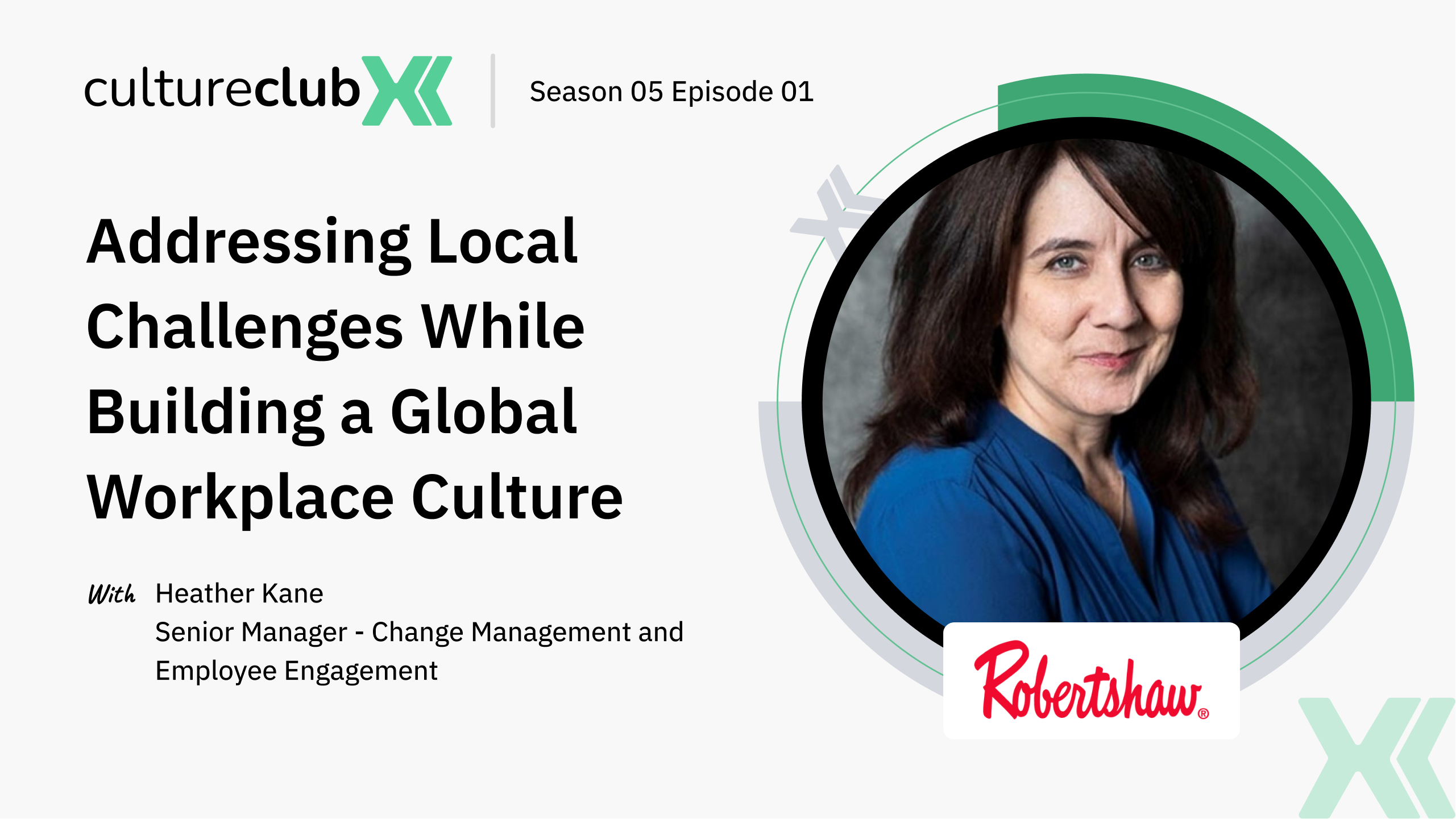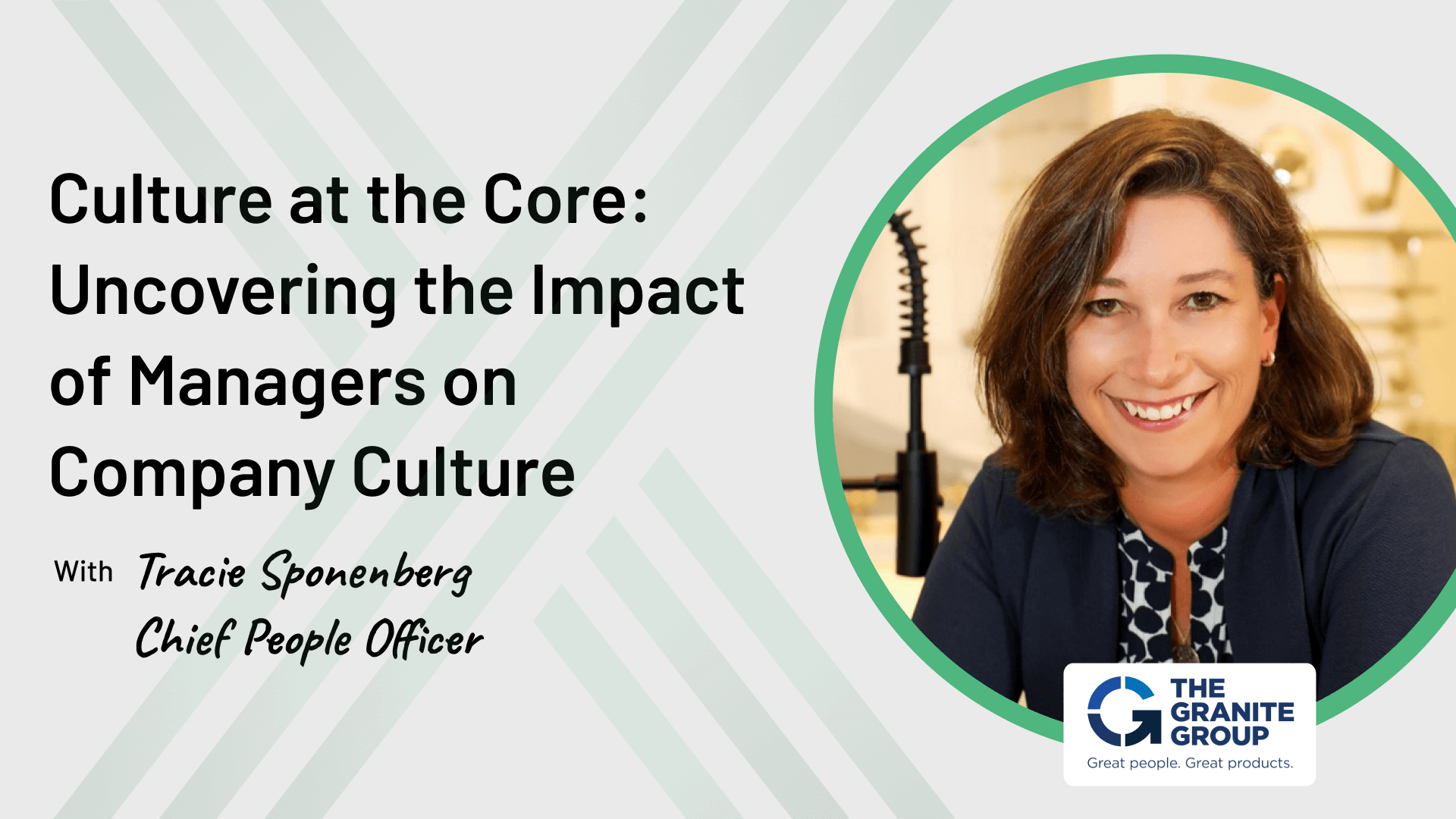S05 E03: Leading through change: Building future-ready leaders
In the third episode of Season 5 of CultureClub X powered by CultureMonkey, host Jodie O’Brien sits down with Lauri Romano, former Director of Learning and Development at Bausch Health, to explore how leaders can guide their teams through uncertainty and prepare them for the future of work.
About Lauri
Lauri Romano has spent more than two decades shaping organizational growth by building leaders who thrive through uncertainty. At Bausch Health, she led enterprise-wide leadership and learning initiatives, helping managers navigate complex, fast-changing healthcare landscapes.
Before that, she spent eight years at Horizon Blue Cross Blue Shield of New Jersey, designing programs that fostered resilience, agility, and continuous development.
With pivotal roles in talent management and organizational development across industries — from pharmaceuticals to engineering — Lauri brings a uniquely broad perspective on how culture and leadership intersect.
An alum of Villanova University with a background in sociology and human resource management, she grounds her leadership philosophy in both people science and business pragmatism.
Today, she continues to share her expertise with leaders and organizations to help them build future-ready cultures.
Here’s the gist of what Lauri speaks about in this video
- Why the biggest leadership challenge today isn’t just logistics — it’s guiding teams through the emotional and cognitive toll of constant change.
- How leaders can balance speed and sustainability, showing up with clarity, emotional intelligence, and vulnerability while pacing transformation intentionally.
- What’s missing in traditional leadership development — and why organizations need to move beyond static skills to adaptability, systems thinking, and comfort with ambiguity.
- The three essential traits of future-ready leaders: empathy, adaptability, and purpose, and how they fuel engagement during transformation.
- How leaders can foster psychological safety and resilience, turning disruption into an opportunity for growth.
- Why empathy, inclusivity, and trust must be embedded into leadership programs not as “soft skills,” but as strategic capabilities that drive performance.
- How technology, AI, and emerging tools are reshaping leadership development — and why data fluency and human-centered leadership now go hand in hand.
- Practical ways organizations can use real-time learning, coaching, and scenario-based experiences to build leaders who thrive amid change.
Catch all this and more with Lauri Romano in S05 E03 of CultureClub X.
Transcript
Jodie O'Brien: Hello everyone and welcome to the fifth season of CultureClub X powered by CultureMonkey. I'm your host Jodie O'Brien.
CultureMonkey is an enterprise employee engagement platform that helps people leaders listen to their employees and enhance workplace cultures. CultureClub X powered by CultureMonkey is our community initiative where global leaders share best practices from their experiences and discuss all things company culture.
Jodie O'Brien: For the third episode of CultureClub X, we are honored to have with us Lauri Romano, a former Director of Learning and Development at Bausch Health.
Welcome, Lauri. It's a pleasure to have you on today.
Lauri Romano: Thank you, thank you for having me, I'm excited.
Jodie O'Brien: We're so glad to have you and we understand that you have spent two decades shaping organizational growth by building leaders who can thrive through uncertainty. And these are uncertain times.
At Bausch Health, you led enterprise-wide leadership and learning initiatives, helping managers navigate highly complex and changing healthcare landscapes. Before that, you spent more than eight years at Horizon Blue Cross and Blue Shield of New Jersey, designing and driving programs that fostered resilience, agility, and continuous development across teams.
It sounds like in your earlier career too, that included a lot of pivotal roles in talent management and organizational development across sectors like pharmaceuticals and engineering, and it all gave you a broad perspective on how culture and leadership intersect in different industries.
You're an alum of Villanova University and hold a bachelor's degree in sociology and a human resource management certificate. And it grounds you in an approach in both people science and business pragmaticism.
And so now you're reflecting on your career and you're continuing to share your expertise with us and organizations and leaders everywhere, building that culture, future readiness.
We're so glad to have you, Lauri. I love the introduction. You have a tremendous amount of experience to bring to this podcast.
Lauri Romano: Yes, I do. I've been in this space my entire career. One of the few that can probably say that.
Jodie O'Brien: I bet that's true because a lot of people change careers. You know, they hop from one industry to the next and you've been at it for a long time.
So thank you for joining us today on this episode of CultureClub X, leading through change, building future-ready leaders. So before we dive into this conversation and this discussion, can you tell us a little bit more about yourself and your leadership journey?
Lauri Romano: Yes, I started out in learning and development a long time ago when we still used overhead projectors and had no technology to really teach people and leaders. And we did things that were fun and we liked to do.
And now the world has changed. We need to do just-in-time training and really make leaders ready instantly to face the challenges that are coming their way.
Jodie O'Brien: That's fantastic, Lauri. It's so true. The age of overhead projectors might be over, but we still like them, right? We'll bring up a PowerPoint every now and then. I love that.
Well, thank you so much for just sharing a little bit about your journey today. And to get started with our conversation, I obviously have my first question for you - which is, what do you see as the biggest challenges that leaders face today in guiding teams through this constant change?
Lauri Romano: One of the biggest challenges leaders face today, I believe, in guiding teams through the emotional and cognitive toll of constant change isn’t about managing logistics or rolling out new initiatives. It's about helping people navigate ambiguity, maintain engagement, and really stay resilient when the ground keeps shifting beneath them, because that's what happens when a change occurs.
Leaders are being called to show up with both clarity and emotional intelligence, which we hear a lot about these days. And what that translates to is communicating transparently, listening deeply, and creating psychological safety so teams feel supported even when outcomes are uncertain.
It also means being adaptable, being open to feedback, learning in real time, and really showing vulnerability when appropriate. Another challenge is balancing speed with sustainability.
In fast-paced environments, it's tempting to push for quick wins, but real transformation requires space for reflection, skill building, and trust. Leaders must be intentional about pacing change, aligning it with purpose, and equipping their teams with the tools and mindsets to thrive, not just survive.
Ultimately, leaders who succeed are those who can treat change not as a disruption, but as a catalyst for growth, and who can bring their teams along with empathy, vision, and a steady hand.
Jodie O'Brien: So, Lauri, why do you think so many organizations struggle to prepare their leaders for that uncertainty, and what's missing in traditional leadership development?
Lauri Romano: Many organizations struggle to prepare leaders because traditional leadership development often focuses on static competencies—things like decision making, delegation, and communication—without equipping leaders to thrive in ambiguity.
The reality is uncertainty demands a different skill set: adaptability, emotional intelligence, systems thinking, and the ability to lead through complexity without clear answers.
What's missing is the intentional development of not just skill sets. Leaders need to build comfort with discomfort, learn how to pivot quickly, and foster resilience in themselves and their teams. That means moving beyond workshops and frameworks into experiential learning, coaching, and real-time problem solving.
It also means creating space for reflection, vulnerability, and growth, especially when the path forward isn't linear. Organizations that succeed in this space are those that treat leadership development as a living system, not a one-time event.
They invest in continuous learning, build psychological safety, and empower leaders to lead with both clarity and compassion, even when the future is uncertain.
Jodie O'Brien: What qualities or skills do you think are most critical for leaders today to implement for their people—especially for keeping employees engaged during transformation? I know you said vulnerability is a big one.
Lauri Romano: In today's landscape of constant transformation, I think the most critical qualities for leaders are empathy, adaptability, and clarity of purpose.
Employees aren't just looking for direction; they're looking for connection. Leaders who can communicate transparently, listen actively, and show genuine care for their teams build trust, and that is the foundation of engagement.
Adaptability is equally vital. Transformation often means ambiguity, and leaders must be comfortable navigating the unknown while modeling resilience and optimism. That doesn't mean having all the answers. It means being open to learning, pivoting when needed, and empowering others to do the same.
And finally, purpose. When employees understand the why behind the change and see how their work contributes to something meaningful, engagement skyrockets. Leaders who align transformation with values and vision create momentum that's not just strategic, but deeply human.
Jodie O'Brien: So what role do you feel leaders actually play in fostering resilience and psychological safety during moments of change? That can be really hard for employees.
Lauri Romano: It sure can. Leaders play a pivotal role in fostering resilience and psychological safety during moments of change.
In fact, their presence and behavior often set the emotional tone for the entire organization. When change hits, people look to their leaders not just for direction, but for stability, empathy, and trust.
Resilience starts with modeling. Leaders who show vulnerability, acknowledge uncertainty, and still move forward with purpose give their teams permission to do the same. It's not about having all the answers; it's about creating space for learning, adapting, and growing together.
Psychological safety, meanwhile, is built through consistent communication, active listening, and inclusive decision making. When leaders invite diverse perspectives and respond with empathy and make it safe to speak up—even when things are very messy—they create a culture where people feel valued and supported.
Ultimately, leaders are the bridge between strategy and humanity. During change, their ability to connect, clarify, and care is what transforms disruption into opportunity.
Jodie O'Brien: That makes a lot of sense. And you know, everybody talks about leadership programming. How can leadership programs embed empathy, inclusivity, and trust as core capabilities for managers?
Lauri Romano: Leadership programs can embed empathy, inclusivity, and trust not just as soft skills, but as strategic capabilities that drive team performance and culture. It starts with intentional design.
Programs must go beyond theory and create space for self-awareness, reflection, and real-world practice. That means integrating tools like 360 feedback, emotional intelligence assessments, and coaching conversations that help managers understand how their behavior impacts others.
Empathy is cultivated when leaders learn to listen actively, suspend judgment, and respond with curiosity. Inclusivity is built through exposure to diverse perspectives, bias interrupters, and exercises that challenge assumptions.
And trust—well, that's the outcome of consistent, values-based leadership, reinforced through role modeling, transparent communication, and accountability.
The most effective programs also embed these capabilities into everyday leadership moments—performance reviews, team meetings, goal setting—so they're not just learned, but lived.
When empathy, inclusivity, and trust become part of how managers lead, they create an environment where people feel safe, seen, and empowered to grow.
Jodie O'Brien: Really well said, absolutely. So leadership development is core to all of that, and evolving it to help managers adapt and thrive in a changing workplace is key.
What practices have helped strengthen culture that you've seen?
Lauri Romano: Leadership development must evolve from static, one-size-fits-all models to dynamic, personalized ecosystems that prepare managers to lead in a tech-driven world.
As AI and emerging technologies reshape how we work, leaders need greater technical fluency, adaptive mindsets, emotional intelligence, and the ability to lead with both data and humanity.
Programs should integrate real-time learning, coaching, and scenario-based experiences that mirror the pace and complexity of today's workplace. We need to teach leaders how to interpret data ethically, foster inclusive innovation, and navigate the human impact of automation.
That means embedding digital literacy alongside empathy and helping managers build trust even as workflows become more digitized.
As for streamlining culture, technology has been a game changer. From optimizing LMS platforms to deploying engagement surveys and 360 feedback tools, I've used tech to create scalable, transparent systems that reinforce values and drive connection.
When used intentionally, technology doesn't replace culture—it amplifies it. It allows us to be better listeners, respond faster, and personalize development in ways that truly meet people where they are.
Jodie O'Brien: Really well said, thank you, Lauri. Well, it's definitely clear from today's conversation that future-ready leadership isn't about one-off programs or rigid frameworks. It's about equipping managers and employees alike to thrive amid change.
We touched on how resilience and psychological safety anchor culture, why empathy and inclusivity need to be at the heart of leadership, and how technology is reshaping what it means to grow and adapt in the workplace.
At the end of the day, the leaders who succeed will be those who can listen deeply, adapt quickly, and lead with trust. And at CultureMonkey, that's exactly where we aim to support. We help enterprises decode employees' sentiment and engagement at every single level. We empower leaders and managers with the insights they need to build trust, strengthen culture, and drive meaningful change across all locations.
Jodie O'Brien: Lauri, it's been such a privilege to have you on CultureClub X today. Before we sign off, could you share with our viewers how they can connect with you if they'd like to continue the conversation?
Lauri Romano: Sure, they can connect with me via LinkedIn. I'm on LinkedIn, and I have a lot of information there. And also, if they would like, they can email me at laurieannromano@gmail.com. That's L-A-U-R-I-A-N-N-R-O-M-A-N-O at gmail.com.
Jodie O'Brien: Your wealth of experience has been a delight to listen to today. Thank you once again for your time and wisdom.
And to our listeners, thank you for tuning in. Don't forget to follow, share, and rate this podcast.
As always, keep listening to your people and leading with purpose. That's all we have for you in this episode of CultureClub X powered by CultureMonkey.
Until next time, this is your host Jodie O'Brien, signing off.



